#I don't necessarily mean it antagonistically
Text
Multiple Hermitcraft video titles this week: "Trying to find a way home from Empires! :D"
Me: "I hope every attempt you make just fails instantly because lore"
#I don't necessarily mean it antagonistically#but also yes I do#I hope their attempts blow up in their faces and they have to linger for a few more weeks#HC x Empires#Hermitcraft#Empires SMP#AND LISTEN#maybe this is just a me problem#but I have NOT had enough Team Rancher interaction in this crossover#They need to fill their quota before they leave
113 notes
·
View notes
Text
Okay, I made a very interesting discovery today. Or rather, I remembered something I had read many years ago, but didn’t understand the implications back then.
In the last tale of the Silmarillion, called Of The Rings of Power and the Third Age, there is a sentence about the War of the Last Alliance:
All living things were divided in that day, and some of every kind, even of beasts and birds, were found in either host, save the Elves only. They alone were undivided and followed Gil-galad.
All living things except Elves. This means there were Orcs fighting for the good side!
#tolkien#silmarillion#lord of the rings#orcs#war of the last alliance#that doesn't necessarily mean there were 'good orcs'#perhaps elendil had subjugated some orc tribes or perhaps some orcs were antagonistic to sauron and this was an alliance of convenience#i remembered this line because bret devereaux brought up the possibility of saruman adding his armies to the good side on his blog#in the last part of the series on helms deep#then i realized that#something like that has apparently happend before in middle earth#i don't know what circumstances lead to some orcs (and also some trolls etc) fighting for the last alliance#but the book implies they did
1K notes
·
View notes
Text
"Paul isn't the hero so he must be the villain-" I need you to stop right there and accept the fact that not every story requires or intends to have A Singular Hero and A Singular Villain and if a protagonist isn't one then they *must* be the other, and that the majority of complex stories actually do not have many characters who perfectly fit the role of "the hero" or "the villain"
#dune#paul atreides#only kind of though i've been thinking abt this for a while#actually starting to kind of hate the words hero and villain at this piont#“x was the REAL hero while y was the REAL villain!” listen to me. listen.#a protagonist is not necessarily heroic and an antagonist is not inherently villainous#and there are shades of grey in between all those which most characters within a story will probably inhabit#i thought this was bad enough in the got/hotd fandoms but nope it's everywhere#i don't wanna blame superhero movies bc that's mean and kinda inaccurate but in my head i am blaming superhero movies a little
13 notes
·
View notes
Text
i just wanna point out that, like. it's okay to disagree with the main character. just because they're the pov of the story doesn't mean they're infallible or that their word is law? you can like that character that tried to kill the mc. you can think the mc made the wrong choice. you can forgive things that the mc would never forgive, or choose not to forgive things that the mc does, because you're not the main character. you are the reader of the story, and just because you can't change it (and it's not the author's responsibility to capitulate to fans) doesn't mean you can't form your own opinions about it. it's fictional! that's the point! have fun with it!!
#sometimes.... main characters....... can be wrong#of course authors will generally try and make you like or agree with the mc (in some way at the very least) but like.#even the most perfect 'good guys' have flaws or else it's not usually a very well written story. and it's okay to acknowledge that!#it's not even really an issue of the whole 'protagonists can be bad guys/antagonists can be good guys' thing (ex. death note)#but like. even if you 100% root for the mc and think they're totally in the right you can still..... like the character that betrayed them?#nothing you say or think about them will make them NOT betray the mc in canon. so why does it matter if you like them despite it?#it's fiction - you can like multiple parts of the story simultaneously. it's okay. i give you permission.#on a similar note. it's okay for people to have different opinions about the same thing#to continue the analogy: maybe your friend doesn't forgive that guy for the betrayal but you do. that's great!#everyone can have an opinion about that guy and just bc someone disagrees with you doesn't mean you can harass them to change their mind.#while im down here#sorry about all this. im procrastinating on a project and ill do anything to stop thinking abt it so im thinking abt this instead#take death note. i do NOT agree with light but i also don't necessarily agree with L either. and i like both of them!#light HATES L and yet he's one of my favorite characters. i hate everything light does and yet i really enjoy reading from his pov.#its not black and white!#have opinions! change them after two days or think about the same blorbo for years! critical thinking and personal enjoyment can coexist!#anyways.
5 notes
·
View notes
Text
Apollo and the demonization of power
I graduated and I'm back on my shit, y'all.
I saw this post by @apollosgiftofprophecy (hi Alder) about whether or not Apollo should have stayed mortal instead of regaining his godhood, and may I just say I 1000000% agree.
To summarize the post: if Apollo had chosen to stay mortal, his promise to Jason (to remember what it means to be mortal/human) wouldn't have meant nearly the same as if he'd gone back to Olympus. Regaining his godhood allowed him to chose to help people with his full ability and remember his humanity for however long it takes for him to fade.
And if I may add on: Apollo even talks about maybe choosing to stay mortal at some point in the latter half of the series, but eventually comes to the conclusion that to chose to stay mortal would be akin to running away from his problems. And he's right: if he chose to stay mortal, he wouldn't have to face Zeus again and he could shirk his responsibilities as an Olympian. So he decides against it (not that he really ever has the chance to chose). And I just love to take this as a great moment of character development and an insane amount of self-awareness for somebody who started their arc where he did.
But it also got me thinking. And, in short, I came to the conclusion that Apollo must be an idealist simply by the way he views power.
In this case, fiction reflects reality: villains want power. They want control. They want to squash rebellion. And that, typically, is an occurrence we typically only see with villains. Never with the heroes, who rarely want power outside of defeating their enemy. But here we have Apollo, who spends the entire series literally seeking power in his attempt to regain his godhood.
And that has morphed into something really interesting when it comes to representation of power in classical media. More often than not, power is demonized. It's seen as something inherently evil. If a character wants power for themselves, they're likewise seen as evil. Any one of your classical antagonists are going to, at some point in their stories, want power in any which way it presents itself. Voldemort of Harry Potter wanted to live forever. Sauron of Lord of the Rings wanted the Ring of Power. Palpatine of Star Wars wanted control of the galaxy. Zeus wants to rule the Olympians. The list goes on.
On the other hand, in stories where a protagonist seeks power to destroy their opponent, they eventually end up discarding their items of power because they don't want to be 'corrupted'. Harry Potter refused to use the Elder Wand. Frodo destroyed the Ring of Power. Luke Skywalker turned down the Dark Side. Even Percy Jackson declined godhood.
But Rick, in writing Apollo's character, takes an interesting approach and a fun subversion of this trope that I, for one, absolutely love. Previously, he'd written Percy to turn down godhood because he primarily wanted to maintain his humanity. To Percy, being a god and being human are two mutually exclusive concepts. They don't coexist. For Apollo, on the other hand, he accepts power out of a sense of duty, and vows to use it well in the spirit of his promise to Jason. There is no demonization of power. And to Apollo, humanity and godhood are not exclusive concepts. So what does that mean post-trials?
There are two perspectives at battle here. First is demonization: 'power is inherently evil'. But the idea that power corrupts is not necessarily a fact: in my opinion, power in and of itself isn't evil. Yes, it's dangerous, but it's more or less a blank slate. What you do with power, who you are when you have it, is what defines it. And that's a pretty nuanced take, and it comes with its ups and downs, requiring those powerful protagonists to be your most responsible, most dutiful, most kind characters who take up the mantle of power with the full understanding of what it means. Who's to say that you can't achieve power and use it well? So there's the other perspective: 'power is a blank slate'.
Let's look at power from a Zeus vs. Apollo perspective:
Zeus wants power (or at the very least, to maintain his power) as a way of controlling people, squashing rebellion, and maintaining order in the way he sees fit, without any sense of legitimate justice or care for others. It is Zeus' actions that make him evil, not his power.
Apollo, on the other hand, seeks power as a way of solving problems, creating solutions that benefit the greatest amount of people possible, and creating a lasting difference on others to change for the better, just as he did. More often than not, when he reminisces about having power in the series, it's more out of a place of 'this terrible thing wouldn't have happened if I were a god', or 'I could help better if I were a god'. Never once does he view power as a way of controlling or manipulating others. Power, to Apollo, is just the ability to love to the greatest extent possible (re: my meta on Apollo's fatal flaw).
But the interesting thing here is how Apollo views power in general, outside of his own. The idea of demonizing power doesn't even occur to him, despite the fact that he's been the subject of abuse for millennia. What's fascinating to me is the fact that Apollo, having been hurt so often by Zeus' power, doesn't ascribe that same generalization to his own person.
I find that very interesting: abuse does wacky shit to people's brains. By all means, that should have irrevocably changed Apollo's perspective on power as a whole, right? Not if you've learned to view power as something that is part of you, no.
I don't know how other gods besides Apollo view their own power, I actually think it's accurate to say that gods view power as something inherent to their nature. And, honestly, maybe it is. But that's besides the point.
Regardless of whether or not power is inherent to gods, Apollo, throughout his journey, realizes that it must go hand in hand with responsibility and humanity. Power is a privilege. That 'blank slate' perspective is one he learned in his trials, the knowledge that the power he has is something he shapes, and something he has no excuse for. If power is inherent, all of Apollo's wrongdoings are his own failings.
And that's even more interesting when you relate it to his relationship with Zeus. Apollo must likewise know that Zeus' wrongdoings are solely his fault, not a result of his power. It's a fascinating perspective of power coming from somebody who has none, who's been hurt by somebody who has so much. To maintain that optimistic view of power as non-corrosive when faced with your abuser is, I think, the glaring mark of an idealist.
So, what does this mean post-trials?
I think, along the same vein, there is a point where the idealist breaks. They have a glimpse of reality: all is not well. For Apollo, that's at the end of the series where he decides that Zeus is beyond all hope. Take this quote from the Tower of Nero:
Some fathers don't deserve [reconciliation]. Some aren't capable of it.
I suppose I could have raged at him and called him bad names. We were alone. He probably expected it. Given his awkward self-consciousness at the moment, he might have even let me get away with it unpunished.
But it would not have changed him. It would not have made anything different between us.
You cannot change a tyrant by trying to out-ugly him.
More often than not, my favorite stories are the ones where the main character gains power, keeps it, and uses it for good. Aragorn accepted the crown of Gondor. Luke Skywalker chose to train a new order of Jedi. Apollo regained his godhood. And readers of any of my multichap fics know that I love to write this trope as well.
But, much like my mutuals and I have been yelling from the rooftops for LITERAL YEARS, Apollo's story is not over. And once the idealist has 'broken', like we see in the scene above, there's only one way it could go.
To see somebody mishandling their power in a way an idealist knows is corrupt is quite literally a recipe for revolution. Look me in the eye and tell me that the way ToA finished wasn't setting up a revolution. Do it, I dare you.
Regardless, it's safe to say that, at some point, somebody's going to take a look at Zeus and say "you know what? Anybody could do better." Just saying.
Anyways, vive la révolution.
[a masterlist of my other metas]
#toa#riordanverse#trials of apollo#apollogists#pjo#lester papadopoulos#apollo#meta#analysis#toa analysis#toa apollo
239 notes
·
View notes
Text
Okay but you know what's really clever about the choice to include off-screen campaign content in the Nein animated show, is that it puts the audience on far more equal footing.
There's a lot of intrigue going on in Wildemount behind the scenes, and those of us who've seen the campaign have an idea of what that is, but rarely a clear answer. There are a lot of interpersonal dynamics that we don't see but that make a major impact on outcomes for the character: not only Essek's dealings with the Assembly but his relationship to the rest of the Dynasty's upper echelon, the Assemblies' interactions amongst themselves, Astrid and Eadwulf's dynamic with Trent or other scourgers, or Lucien's relationship with Cree and the other Tomb Takers. These alliances make or break the characters' decisions with regard to the Nein depending on how much loyalty or trust they share, and they shift a lot while the Nein aren't present.
I think there's a bit of this in tlovm with the happenings in Whitestone and the dynamic among the Chroma Conclave, but these exist primarily to ground the antagonists, because it's not the same kind of story; Vox Machina's story is about how they become Big Damn Heroes. There is political action happening, but while it does have an influence on them, it always exists to an extent to be either a boon or an obstacle to them, because it cannot deal with the threats at hand without heroes (not necessarily Vox, but in the archetypal sense). The Nein, in contrast, are in a story about being the tangential players to numerous plots of intrigue that occupy no small position of power in the world, plots that in fact actively resist the role of heroes, and the struggle for personal agency that comes with that.
So giving more information to the audience about those other happenings means new fans get a lot of the information that existing fans will go into the show with much sooner, while existing fans are receiving new information at the same time. By the time the characters find out what the audience knows, the audience is more or less on the same page waiting for that shoe to drop.
#m9 animated#mighty nein#critical role#cr meta#I have so many feelings about this okay it is GREAT as a choice for this narrative#I have so much shit to do why as I given things to have thoughts about TODAYYYYY
400 notes
·
View notes
Text
Near Uniquely RWBY - Main Characters
I was chatting with my sibling the other day and we were joking about the fact in 90% of the media I consume I generally don't like the main characters.
Not in the sense I necessarily hate them, but I generally don't find them to be the most interesting, engaging or enjoyable person on screen or page. Instead I tend to gravitate towards secondary or minor characters and even minor antagonists before any of the big names.
Some of this is rooted in my often rooting for what tends to feel more like a real underdog or characters that feel like they got dealt a bad hand by the author unfairly. But its also that in a lot of media the main characters tend to immediately, slowly or quickly go into personality lockdown.
Becoming less a personality and more the embodiment of expected tropes and themes, or they lose their unique edge or circumstances because the plot demands one benefits or personality changes be heaped on them to keep the tone and story going.
Some examples of this would include say:
Ichigo from Bleach, with him and his supporting cast being very unique and super interesting during the initial arc. But as Soul Society came in, he became a much more standard Shounen determinator a the expense of his personality and his supporting casts were largely watered down & left behind.
Or how in Naruto or Dragon Ball the whole underdog/hard worker aspect of the characters felt undercut by legacy power ups and an endless wellspring of natural talent, alien biology, ETC.
I know these are just two examples, but they cover the general gist of what I mean.
So, what makes RWBY different?
Well, off the cuff, is simply that the four main characters are women.
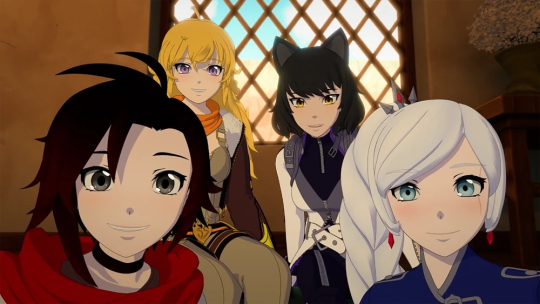
I've often felt simply putting anyone other than a cis-het guy into the main character slot of say, a battle Shounen, or Isekai stands a good chance of making it more interesting by default. Even if the author does nothing with it the audience reaction would be different because the MC would be an exception to the norms.
In that vein, while one can call RWBY some sort of Shounen or adventure fantasy or magical girl show the main four are unique in how they manifest on screen at the very start. From how they participate in action, to how said action is structured and framed and the kind of adventures and topics they tackle.
But being unique alone is not enough, that would simply make it more interesting than the bog standard but what elevates RWBY is the execution and exploration of such elements and its characters.
Going into every aspect would be difficult, but in light of what I said above would be how each of the main four are initially presented as familiar archetypes, only to subvert or deconstruct them.
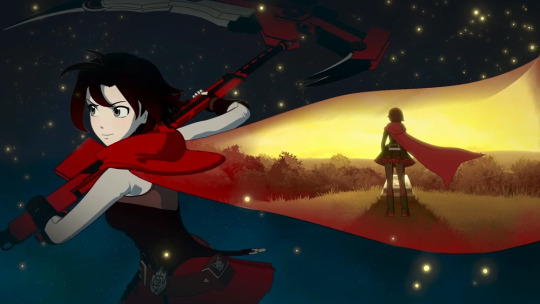
Ruby is a peppy goth who just wants to be normal but has inborn powers from her mysteriously vanished mother and serves as a beacon of optimism to others.
Except Ruby's version of normal still involved fighting death monsters with a sniper rifle scythe and she is actually one of the more ruthless characters. Her peppy persona obscures that she can have a pretty vicious temper when pushed and has displayed strong bloodknight tendencies.
Her unrelenting optimism and desire to fix the world is a complex mix of true beliefs, coping mechanism for trauma and her grappling with positions forced on her against her will. Her inborn power is potentially useful but also not that much of a game breaker outside specific contexts & said power sure as hell didn't save her mom.
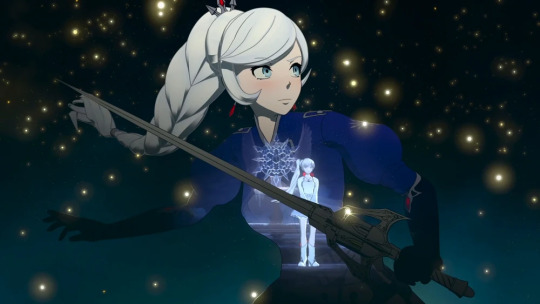
Weiss Schnee is the Tsundere heiress of a powerful family, with a haughty attitude that hides her loneliness.
Except the "Tsundere" is more of a defense mechanism born of coming from an abusive home where every member of her family manifested a different trauma response. Freeze (Mother), flight (Sister), Fight (Weiss) Fawn (Brother).
Despite her upbringing & some projected trauma, she's far from ignorant as to the worst excesses of her nation early on, and her journey was more about overcoming the impacts her abuser had on her and finding a family in her team that let her be safe enough to let down her walls. Also despite being "The ice queen" she's actually one of the characters least inclined towards more ruthless actions and is extremely empathic.
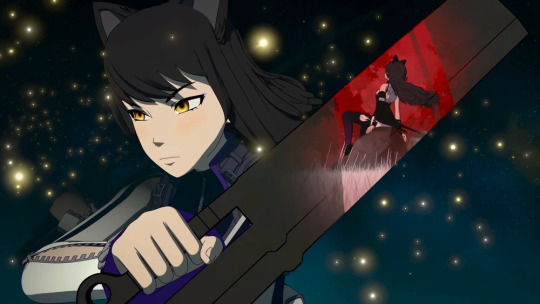
Blake Belladonna is a mysterious and silent rougish woman, something of a shrinking violet even, but she carries with her a wounded heart thanks to her old flame, the edgy Adam Taurus.
Or more accurately, Blake is the daughter of activists and politicians who represent the worlds main discriminated against minority. She spent her youth on the road as a protestor and where even her father could be nearly killed by a lynch mob. She was targeted & groomed by a man who claimed to want to fight the same injustice she did but who was only interested in using the movement to grow his own power.
Her initial aloof-ness was a trauma response to having spent years under his thumb and overcoming him and the idea she had to 'save' him was one of the main corner stone so her character. Also, despite the "Revolutionary fighter" backstory she like Weiss is much less inclined towards ruthlessness than her team in large part because her past experience with it.

Yang Xiao Long, introduced as the fun loving big sister of Ruby & boisterous bruiser of the team who loves to party & flirt.
Except no, Yang was parentified as a child and forced to raise her own sister as their family unit fell apart. Her "Party girl" persona was outright framed as judging a book by its cover in her own trailer and something she put on or took off as she needed.
She became disabled over the course of the series run as well as entered a Sapphic romance with her partner Blake. Unlike the stereotype of characters with her design, Yang is actually an excellent student, fighter and engineer/mechanic. Plus much like her sister she tends to be of the more ruthless and pragmatic persuasion despite being from the "Normal" background.
Character Conclusion
So, all the characters break out of their initial archetypes, which already makes them more interesting. What's more, these sorts of characters just being oput together and made the main characters rather than circling a dude is in of itself unique.
But there are other aspects of the writing which endear me to how it handles the main characters and what keeps them interesting.

Anger & Violence
See, while in various media women do express anger at times it is still often far less so than men. What's more, often women's anger tends to be presented in... Less flattering lights.
With the anger obscuring fragility while in a man it conveys strength. Or implying a sort of hysteria rather than an appropriate or controlled response. Or worst of all being demonized in general unless its rooted in or coming from traditionally feminine places.
The same tends to be true when it comes to violence with a lot of media either trying to find some way to make women in battle less... Brutal than their male counterparts. (More more like fanservice) Along with rarely letting women fight men, unless they are a special exception to the norm.
RWBY does not do this.
The main characters, hell, all the women in the series express a multitude of different forms of anger and violence. They battle men, they battle each other, they battle monsters all with no distinction nor fanservice shot in sight.
What's more though is that said anger and violence are not presented as, for lack of better words, wrong. The writers don't draw overt attention to this fact, they don't hang a big sign up saying "Girls can fight & shout too" or the like.
They just present these women with a range of emotions, motives and actions that are treated according to what fits the theme of the show rather than hewing closer to gendered lines.
This isn't to say anger & violence are lionized, but more that the experience and usage of them is not demonized or undermined because of the characters gender.
I suppose what I am saying is that CRWBY by and large lack double standards when it comes to exploring these things that I see so often in other media. The women in the main cast, among the villains, both sides respective allies and beyond can be flawed, or angry or do both good and terrible things.
But the writers are always treating everyone's pain as equally valid regardless of gender or situation. Which means that the situations that cause anger exist within a tone of respect that forms the depiction and framing of anger itself.
Which is just something I really enjoy.
Thanks for reading!
#RWBY#Save RWBY#greenlight volume 10#Team RWBY#ruby rose#weiss schnee#blake belladonna#yang xiao long#Some other series that do this or touch on it are She-Ra#The original Sailor V manga but less so Sailor Moon#& to varying degrees the Owl House#Thanks to Adam for helping me with the conclusion!
247 notes
·
View notes
Text
I mentioned in this post that I thought it would take a life or death choice about Imogen for Liliana to flip, situationally, as opposed to the party being able to convince her to change her ideology (cult juice is strong), and it seems we may have gotten an element of that in Liliana flying to Imogen's aid against Otohan. I'd be very curious what Liliana would have done if she'd gotten there in time to fight, but we'll never know, so we have to digest the moment we got. I also think FCG's death adds another dimension both in-game and above the table. Since we dropped out literally mid-scene after her arrival this post may get stale immediately after the first few minutes of next week's episode, but for now I think it's safe to say that at least for the time Liliana spends with the party right now she will not be an active antagonist. Her daughter called for help and she answered, and her first act was trying to comfort her. Matt also wouldn't hit the players with another big battle fresh off the first (and with that outcome), so if they do have to face Liliana as an enemy it would be later under evolved circumstances.
To be clear I don't think FCG dying means Matt nerfs the threat of Liliana or that this situation means she has flipped permanently, but rather, it neatly interrupts the established dynamic between Liliana and Imogen thus far and creates a chance for new dialogue that doesn't just repeat all the same things as before. Imogen hasn't needed her mother - not really - and maybe still doesn't, but she called for help and is grieving now and the conversation doesn't necessarily have to be the same old "Liliana renounce your cause" but rather "help your daughter here and now" and to connect with her through that emotion. This is probably the best opportunity they'll ever get to flip Liliana in a more than "last ditch in a crisis moment" kind of way or lay the groundwork for that happening later. Now, the party - and Imogen in particular - may rightly be angry with Liliana as an ally of Otohan, and that FCG died because of the cause Liliana supports. Liliana may want to comfort her daughter while also believing that FCG's death was unfortunate but not ultimately a reason to doubt the cause or escape what she sees as inevitable. It's messy! But it's a very interesting situation and FCG's death is such a visible wound on Imogen that it may elicit Liliana to do or consider things she wouldn't, otherwise.
#As evidenced by her convos with Imogen earlier Liliana often thinks of the cause as a way to help Imogen (get rid of powers)#or that be following through that will protect her (prevent her from becoming the Vessel)#and so it's not a strong enough tactic to say “abandon the cause to protect your daughter”#it takes a more immediate tangible threat to effectively pit the “the cause” vs “imogen's safety” against each other#we can (and should) critique the way Liliana's love for Imogen is very flawed and a bit of a time capsule still seeing her as a child etc#but it IS there in its way and may have its role to play in all of this#critical role#cr spoilers#op#c3#c3e91#liliana temult#imogen
218 notes
·
View notes
Text
Back in March when I was doing the BL Challenge (brought to us by the lovely @negrowhat), I mentioned in my post about Korn Theerapanyakul that it isn't often that we get an actual villain who isn't just a love rival in a BL. The presence of an antagonist in a story doesn't necessarily make them the villain and not every story calls for one either. That being said,
Jak is a villain.

I want to break down this shot because it tells us a lot about the dynamic at play and Jak's point of view.
There's a lot going on here. The first thing my eye is drawn to is the line between them (and how Mut is just slightly crossing it since he stepped into the lion's den). Once you see that, the differences between both sides of that line become more obvious.
Mahasamut is dressed in a dark cool color and he's in shadow but his face is catching the light. The flowers, fireplace, candles, and TV behind him feel warm and homey. Fitting for a cafe. On the other hand, Jak is dressed in a warm light color and he's sitting in the light but his face is in shadow. The windows behind him and his positioning makes it feel like he's sitting at a desk in a corner office in a high rise instead of a cafe.
I weirdly wish they'd shown us when they arrived at the table because I would bet you anything that Jak sat down first. He's the older one, he's relaxed, etc. It makes sense for him to have sat first which means he chose that specific seat and the only reason I mention it, and really the only reason it matters, is that it tells us how Jak sees himself in this situation.
He's sitting there in the light in his dad sweater telling Mahasamut about wanting to fulfill his role as Tongrak's father and that he's so sorry about his behavior in the past and wants to atone for it and it's all bullshit because look at this man's face.

It is completely shadowed, just like his intentions and his agenda whereas Mut's is completely in the light.

And the difference becomes even more stark once Jak tells Mut to break up with Tongrak.


Jak is spewing nothing but ill-intentioned bullshit and Mahasamut sees it for what it is and makes it clear that he isn't going to fall for it, which is why things devolve.
Now. Just so we can get it out of the way, yes, obviously Mut should not have agreed to that meeting. He shouldn't have engaged and should've put the baby in the car and driven in the opposite direction. I was screaming at my screen for him to do just that, as were many of us I'm sure. However, I have to point out that it is not inconsistent for him from a character writing standpoint to have agreed.

Lest we forget, he said this to Tongrak last week when he was explaining why he turned Prin down when she tried to buy him.
"But Leah the dad is so much worse how could he not see—!" I know. Trust me, I do.
I'm gonna put on my baseball uniform and go to bat for my man for a second though because I think part of the reason that he agreed to talk to Jak is that he vastly underestimated him. And to be completely fair to Mahasamut, I did, too.
If I had to guess, I would say that he was expecting to be dealing with someone cut from the same cloth as Prin. Maybe a little worse since he knows what Jak has done in the past but certainly nothing he couldn't handle. Mahasamut is not a reckless or a thoughtless man. I don't believe for a second he would've even walked in the building if he didn't feel confident that he could deal with Jak.
The problem is that Jak is very much not cut from the same cloth as Prin.
I noted in my expressions post that it looked like the only time Jak was actually feeling something was when he accepted Prin's offer to destroy Tongrak but that's not entirely accurate. Having gone back to watch his scenes, there's a second instance where genuine emotion peeks through.

There's such a cold rage in his expression when he reproaches Tongrak for choosing his mother and cutting ties with him. And make no mistake, he's not angry because he loves his son. We already know that he doesn't. He's angry because in his eyes, he lost to a woman he felt nothing but disdain for.
If Tongrak and Kwan had chosen Jak over their mother, do you think Jak would be out here causing problems? No, he would've flat out ignored them. He wouldn't bother keeping such close tabs on Rak and his relationships because he would've already won and if he's doing it now, it's because he wants to win.

This is a game to him. This is fun for him.
His son is terrified and begging him not to hurt an innocent little girl and a young man and Jak's response is, "Don't be greedy."
He tries to force his son to choose which one of the people he loves most in this world gets to be safe but the choice isn't really a choice. He says he'll choose for Rak and he already has. Jak had already had Mahasamut beaten by the time he comes to see Tongrak and we know that because Mut's injuries have been treated when Rak gets home and Vivi is already there.
Matter of fact, the only reason Jak is even here talking to his son is because his attempt to convince Mut to leave has failed and he knows that going to Rak won't fail. He knows his son is afraid of him and he knows he can use that fear to get what he wants, which is why he brings up the uncle doctor.

Although we've gotten little of Jak so far, it's safe to assume that he is not a man who makes empty threats. Tongrak knows this, too, which is why he becomes so panicked when the doctor is brought up. We as the audience don't know who this doctor is but we can surmise from Tongrak's expression that he's important enough to be used as a weapon by Jak.
Until this point I don't think Tongrak realized that his father had anything to do with whatever happened to this doctor, he looks genuinely surprised. But all Jak had to do to prove how serious he is about his threat is mention the man. That's all he does. Rak puts the pieces together himself.

And here is where I bring up next week.

If you can look at this man's face as he rips the contract and think for a moment that he's going to try to push Mahasamut away for some flimsy petty reason, I am here to tell you that you are dead wrong. If I so much as SEE the words 'noble idiocy' I'm going to kick off.
Because we know that by the time Tongrak picks up this contract to rip it, Mahasamut has already been beaten twice and that Jak made a barely veiled threat to have him killed. Rak is rightfully terrified of his father and afraid for his boyfriend's life and wanting to keep Mut safe and ALIVE is not noble idiocy.
Now is it going to work? Smart money says no, wild horses couldn't drag Mahasamut away. He loves Rak too much to take any threats lying down. But as much as I understand why Mut talked to Jak, I understand why Rak wants to keep him safe even more.
Jak didn't accept Prin's offer because he wanted to help her. He doesn't give a single shit about her agenda except to mock her for it. He agreed to destroy his son because he wants to, because doing so will allow him to win and get back at his ex-wife. The money is just a bonus.
Jak is a Villain.
#rewatching jak's scenes does not get any less brutal fyi#there are only two reasons why something is hard to watch:#because it's done poorly or because it's done well#and this was done very well#love sea#love sea the series#meta#conversations with leah
124 notes
·
View notes
Note
"A deuteragonist has a very different role in the MHA and that is a whole other post ."Can you please write this article? I am tired of Bakugo being constantly downplayed. There are very few people who understand his character and role in the story as well as you do.
Haha I mean hehe it's just hoho I never said fufu that Katsuki is the deuteragonist guffaw shucks haha I mean come on snort why are you putting words in my-
Katsuki Bakugou is the deuteragonist.
Katsuki Bakugou is the deuteragonist
Katsuki Bakugou is the deuteragonist
"Of course you would say that. You're a Katsuki Bakugou stan! You are invested in inflating his importance in the story because you love him." - some people, probably
No. If that were true, I would be arguing Katsuki Bakugou is the protagonist. But I'm not.
Because Katsuki Bakugou is the deuteragonist.
It's not that I love him and therefore assert that he's the deuteragonist. I love him because he's the deuteragonist (plus many other reasons). He is an archetypal familiar shounen hero made interesting in part by the fact that he is NOT the protagonist and deliberately written in the deuteragonist role/function, and I will go into visceral detail about this momentarily.
I promise you I don't go around in other fandoms arguing my favorite non-main character is the deuteragonist. I fully embrace whatever role it is they play in the story. YOU WILL SEE THE EVIDENCE OF THIS VERY SOON, FOR EVERY CHARACTER IN MHA.
What is a deuteragonist?
A deuteragonist is a story archetype. They are the second-most important character in a story (which is a vague as hell definition). They are often known as the "secondary main character."
That's it. Everything else one might say about a deuteragonist is just a sub-archetype.
A deuteragonist can be a sidekick, a love interest, a rival, an antagonist, or even a neutral party. They are often, not always, written as foil characters to the protagonist. They often, not always, provide a different and yet similar outlook to the protagonist's. Their utility in a story can be quite varied. Sometimes they support the protagonist, and sometimes they oppose the protagonist. Often, they are used to help the protagonist complete their character arc.
Sometimes, there can be more than one deuteragonist.
What the hell is a deuteragonist?
The problem is, the function of a deuteragonist can change just depending on the type of story we're talking about. A deuteragonist in an ancient Greek tragedy (theatre), where the term originally came from, won't necessarily function the same way as a deuteragonist in a 2-hour contemporary movie. Things get even more complicated when we're talking about a TV series, a book series, or a comic book series in which the cast becomes so large we're likely to see MULTIPLE deuteragonists.
My Hero Academia, like many long-running shounen manga, has an ensemble cast. Would you be surprised if I told you My Hero Academia not only has multiple deuteragonists, not only has multiple antagonists, but also has multiple protagonists? Because it does!
Sometimes people wanna divide MHA into three or four acts and make the claim that the deuteragonist changes from act to act. I say they aren't going far enough. MHA is divided into arcs, and each arc has its own protagonist and antagonist and sometimes even deuteragonist. This is a STAPLE of ensemble cast shounen manga, where often there will be so many characters they get grouped off into trios (or more) and one among them will be the group's designated protagonist.
Sure, in most MHA arcs, Izuku is the protagonist. But he's not always. Who is the protagonist of the Pro Hero (Endeavor vs Hood) arc? Who is the deuteragonist? It's not Izuku and Katsuki; it's Endeavor and Hawks! What about the protagonist in the My Villain Academia arc? Tomura. The Hero License Supplementary Course arc? Katsuki and Shouto (who can't seem to decide if they're co-protagonists or protagonist and deuteragonist and who is which). The Overhaul arc? Izuku is the protagonist and Mirio is the deuteragonist. Some arcs really play with these roles or make it unclear who is playing which role or if the role even exists.
What is a deuteragonist in My Hero Academia?
So if we have a bunch of protagonists, does that mean the most important one is the series' overarching protagonist and the one second in importance is the deuteragonist? It COULD be, but it's not necessarily true.
There aren't that many arcs where Izuku is not the protagonist. If we look at the number of arcs where someone else is the protagonist, following the above logic, we could end up with All Might or Endeavor as the deuteragonist. Maybe some people would earnestly make the argument Endeavor is the deuteragonist--I don't know, I haven't met those people I guess. The problem with this approach in my eyes is that it entirely discounts the deuteragonists of each arc. Would it not follow that the overarching deuteragonist is the character who has played the deuteragonist in the largest number of arcs? What if that character is different from the character who has played protagonist the second-most number of times? And this is to say nothing about if the protagonist or deuteragonist are the same as the antagonist in a given arc! It's difficult to weight any one character in this fashion particularly when you have an ensemble cast.
This is getting into the question of focus and screentime. How much should we weight this metric? Admittedly this one can also be complicated, especially when it comes to long stories with ensemble casts. The question is how much does screentime actually convey how much a character is the focus of a story, and does that necessarily translate to protagonist and deuteragonist? Because for many the question is: could the deuteragonist be an antagonist in MHA?
It just gets a little harder to argue someone besides Katuski Bakugou is the main deuteragonist the more Katsuki's screentime allocation looks something like this:
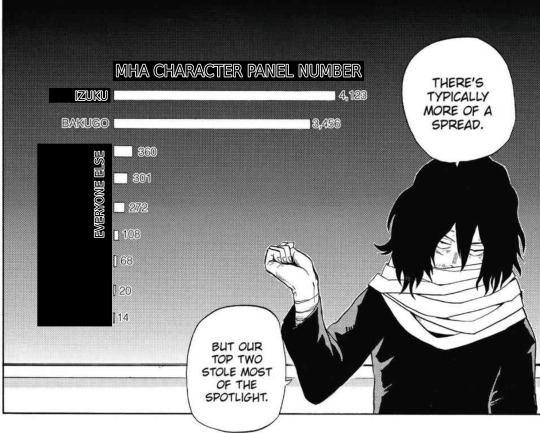
Okay, perhaps that exact size of gap is hyperbole. But there is a clear, measurable gap between Katsuki Bakugou and everyone else and I don't think anyone has ever disputed that. Please check out this post by @dekusheroacademia that has compiled some of these statistics (they also make some excellent points about evaluating the elements of a deuteragonist and how various characters fit or don't fit those characteristics).
Still, this is merely supporting evidence, not conclusive. I am well aware of the concept of a false protagonist, where someone appears to be the protagonist until later someone else is revealed to be the story's true protagonist. And while I've never seen a false deuteragonist where someone SEEMS to be the deuteragonist and is later revealed in a twist not to be (as opposed to the deuteragonist just merely changing NOT as a deliberate twist where expectations were set to be otherwise), that doesn't mean it can't happen.
Tangentially related, we could also potentially look at marketing as another piece of supporting evidence. It's not conclusive that just because Katsuki Bakugou is one of the most merchandised characters in the franchise that he is more important to the story than those who aren't, but it's still notable supporting evidence. After all, based on Horikoshi's marketing of his own story i.e. who he draws in which orientations on chapter and tankoban covers, or how he lists characters on character intro pages, we could easily come to the conclusion as casual readers that Izuku is the protagonist. There are many cases where one could conclude Katsuki is the deuteragonist based on such presentations alone. But again, I concede this is not conclusive.
So, if we set aside individual story arc roles, screentime, and marketing, what does that leave us with?
What is THE deuteragonist in My Hero Academia?
Even if we can determine Izuku Midoriya is THE protagonist of MHA based on things like the number of times he's protagonist in story arcs, his screentime, and marketing, I'll set those aside for the deuteragonist and see if there's something else that can help us here.
What element are we missing? The overall story.
Sure, we can break down the story into arcs and assign deuteragonists that way, but that's not getting us to THE deuteragonist. So let's start with the protagonist. How do we know Izuku Midoriya is the protagonist of MHA without considering the previous metrics? The way the story focuses on him. It is easy enough for anyone to recognize the characteristics of a protagonist in him from a functional perspective. He is a POV character. We hear his thoughts. He narrates the story. We see the story over the timeline of his character growth. His character arc coincides with the overall story themes.
I've talked many times about how My Hero Academia at its core is a story that explores the question: what is a hero? MANY characters explore this question, but the character who compiles these answers together and rounds them all out and grows and has his perspective change and exemplifies the moral is: Izuku Midoriya.
So let's go back to the functional elements of a deuteragonist. Remember those sub-archetypes? Well, in a shorter story with no ensemble cast, what do a sidekick, a love interest, a rival, an antagonist, and even a neutral party all have in common? They are defined by their relationship to the protagonist.
You see, in a story where all the characters interact with each other and converge on the major theme of the story, ALL characters are defined by their relationship to the protagonist. But in particular, the function of a deuteragonist is to supplement the story with what the protagonist needs FUNCTIONALLY. When is a sidekick the deuteragonist of a story? When the story focuses on the adventures of the protagonist and their sidekick. When is a love interest the deuteragonist of the story? When the story focuses on the developing relationship between the protagonist and the love interest (i.e. the romance genre). CAN a story with a love interest deuteragonist focus on their adventures and individual character development too? Yes, but sometimes the result is that the love interest is ALSO the sidekick...or the rival. When is the rival the deuteragonist? When the story focuses on the clash and growth between the rivals. When is the antagonist the deuteragonist? When the story focuses on the battle between them. NOTE that when I write this, I don't mean it focuses on the protagonist's adventure that culminates in them meeting the antagonist at the end for a battle. I am talking about when the BATTLE ITSELF is the main focus of the story. See stories like Silence of the Lambs or Death Note for a clearer example of what I mean, where the focus of each is on the psychological games the protagonist and antagonist play with each other. The point is, the story on a structural level, on a meta level, has to focus on these sorts of interactions to determine its deuteragonist.
Obviously this gets more complicated with a large story and an ensemble cast because you could have bits of the story where the structure changes and seems to focus on new things. That's why I pointed out that the more immediate protagonist and deuteragonist and antagonist often change in MHA depending on the story arc.
When I try to determine who is THE deuteragonist of the entire story, I have to look at the entire story. I have to ask myself what the story is about. So what is the story about? What is MHA about?
If you said MHA is about Izuku falling in love with Ochako, I'm sorry but you're wrong.
If you said MHA is about Izuku taking on All Might's mantle, I'm sorry but you're wrong.
If you said MHA is about Izuku defeating/saving Tomura, I'm sorry but you're wrong.
If you said MHA is about Izuku rekindling his friendship with Katsuki, I'm sorry but you're wrong.
MHA is about Izuku Midoriya (and most everyone else) learning what it means to be a hero.
It's in the fucking title. MY HERO ACADEMIA. The story is about Izuku's education (as it takes many forms) to learn what it means to be a hero.
So who is the deuteragonist in the story about Izuku Midoriya learning what it means to be a hero? The character who is second-most important in how Izuku Midoriya learns what it means to be a hero.
A lot of characters do teach Izuku Midoriya what it means to be a hero or at least some piece. But who is MOST IMPORTANT?
See, My Hero Academia is LONG. If we just focus on the parts of the story in which Izuku tries to learn from All Might or take on his mantle, we lose ARCS of the story. The same is true if we focus on his love life, or his rivalry with Katsuki, OR EVEN HIS BATTLE WITH TOMURA AND ALL FOR ONE. In the case of the latter, we're basically excluding HALF the story: the school arcs!
MHA is structured such that it alternates between what we colloquially refer to as "school arcs" and "villain arcs." And while exploring the question of "what is a villain?" is an important subset of the main theme, it is not the entire story. You can't just label all the school arcs as "filler" (because they're not) and chuck them out. Each story arc contributes to the lessons Izuku learns and the theme of the main story.
I can think of something every character teaches Izuku with respect to this theme. I can think of a lesson Izuku has taken away from every encounter and every story arc. But who ELSE is present in nearly every story arc? Who represents the foil to Izuku who allows us, the audience, to learn alongside them what it means to be a hero? Who learns the bits Izuku does not need to learn because he already exemplifies those answers in spades? Who represents the other half of the hero equation that Izuku is missing? Who has his own blanks filled in by Izuku himself? Who has played all the sub-archetypes of a deuteragonist for Izuku Midoriya, including antagonist, rival, sidekick, and even arguably love interest (replace with platonic interest for the rekindling friendship angle if you want so we don't have to go into that whole thing here please, I'm talking about the generic structural elements within a story more than anything)?

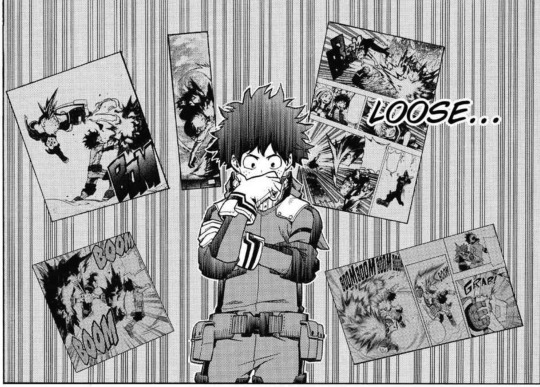
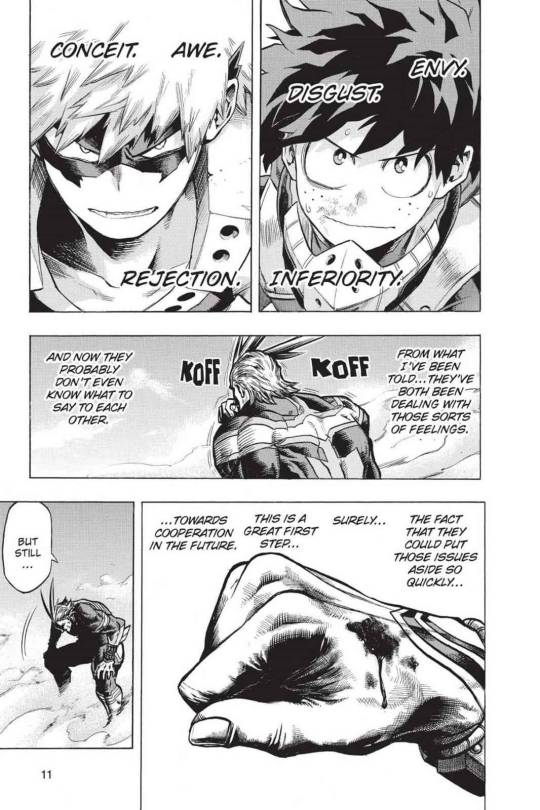
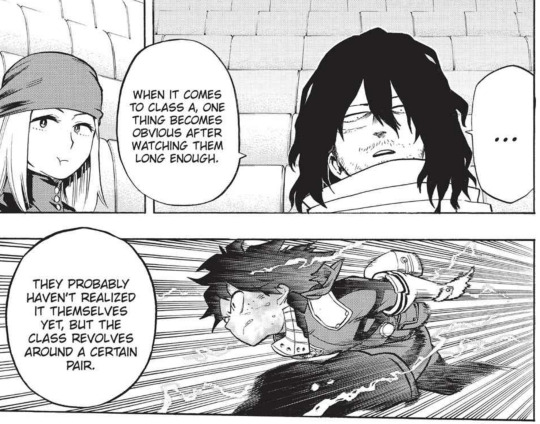
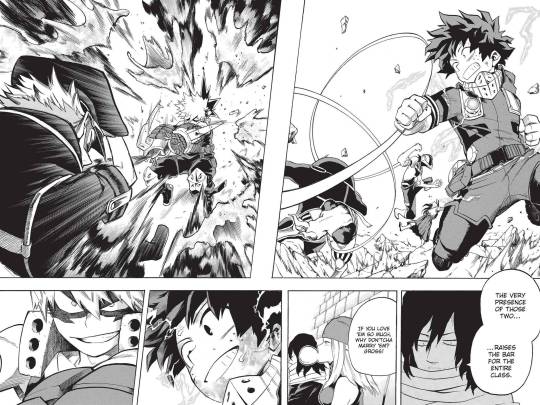
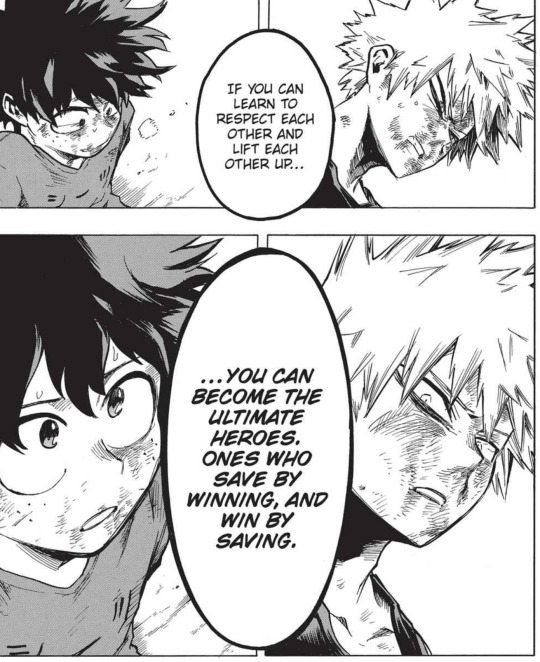
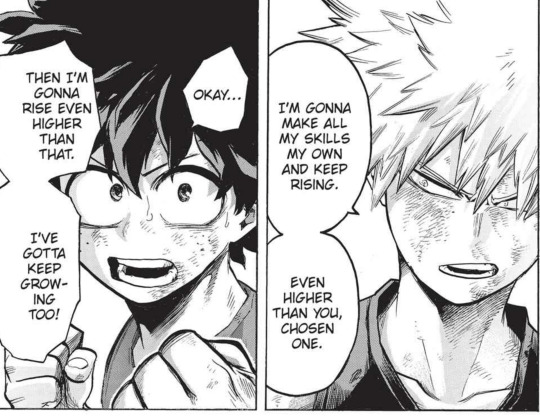
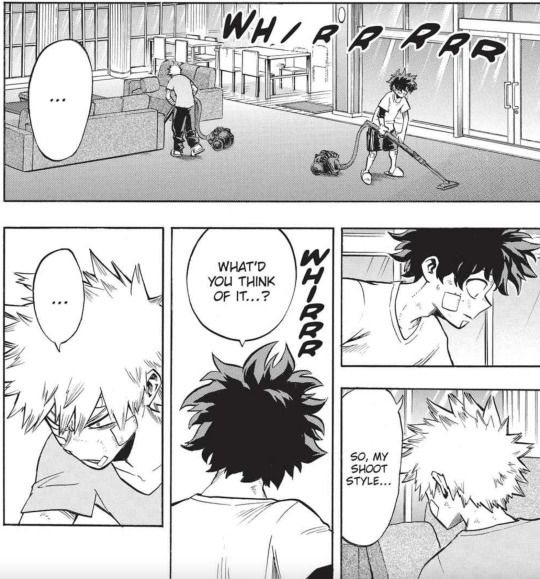
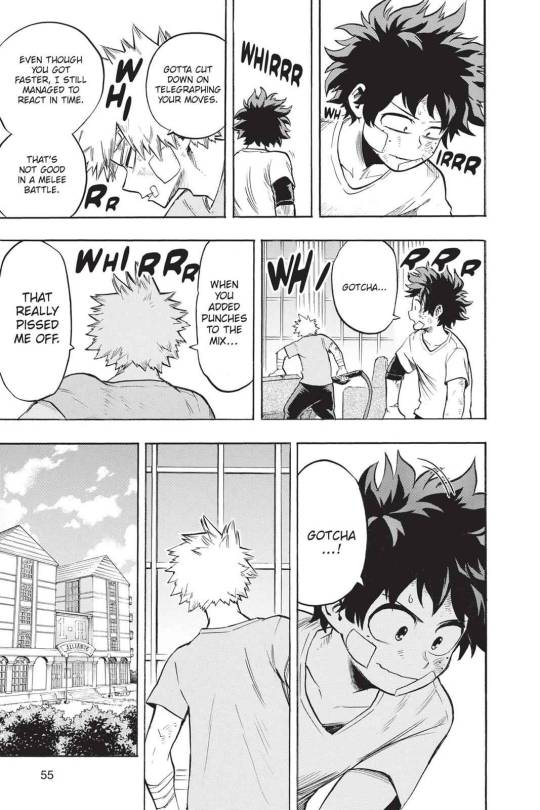
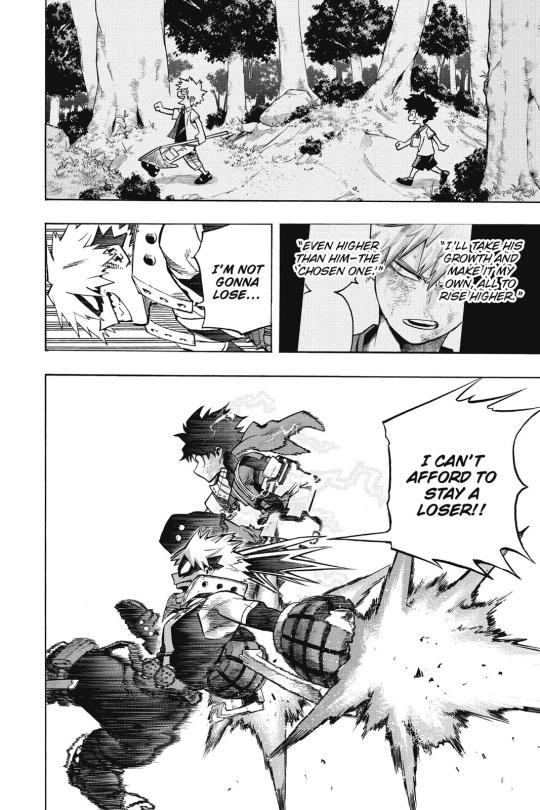
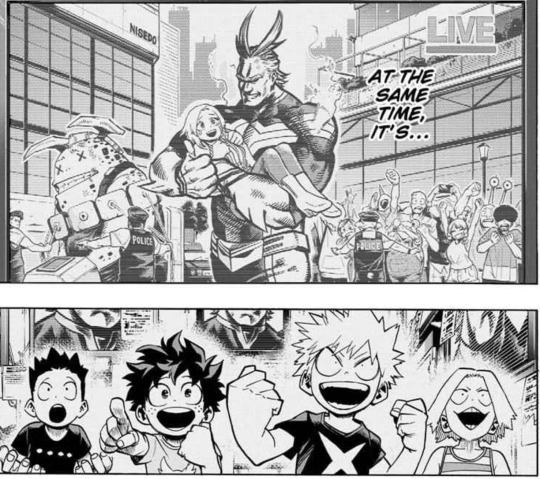
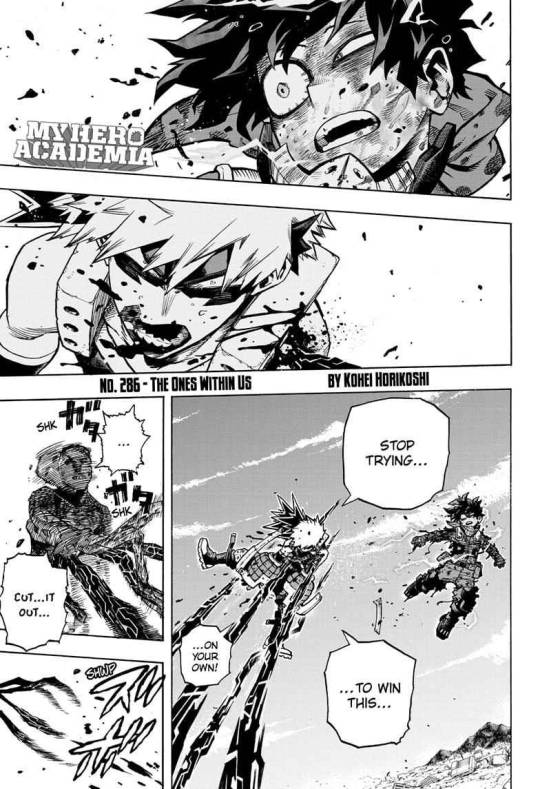

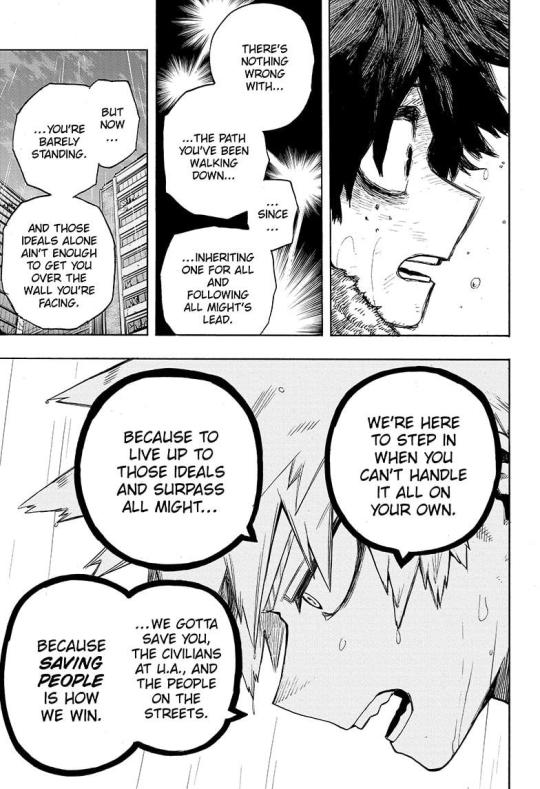
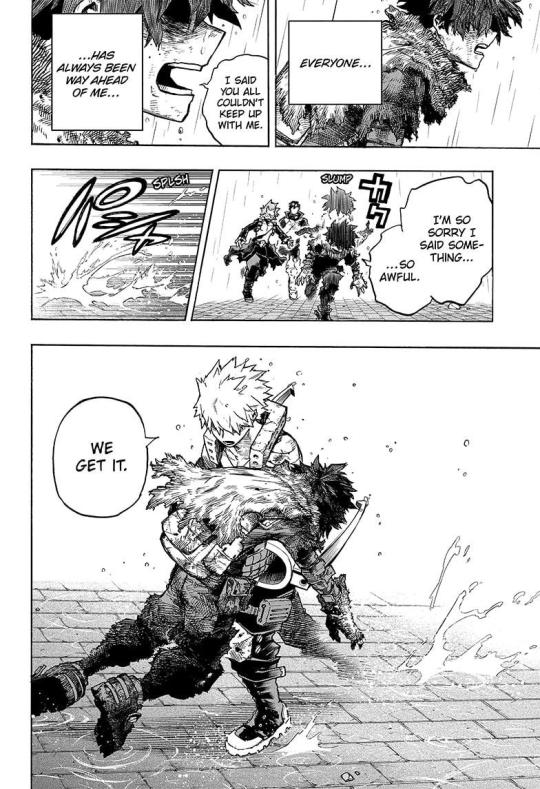
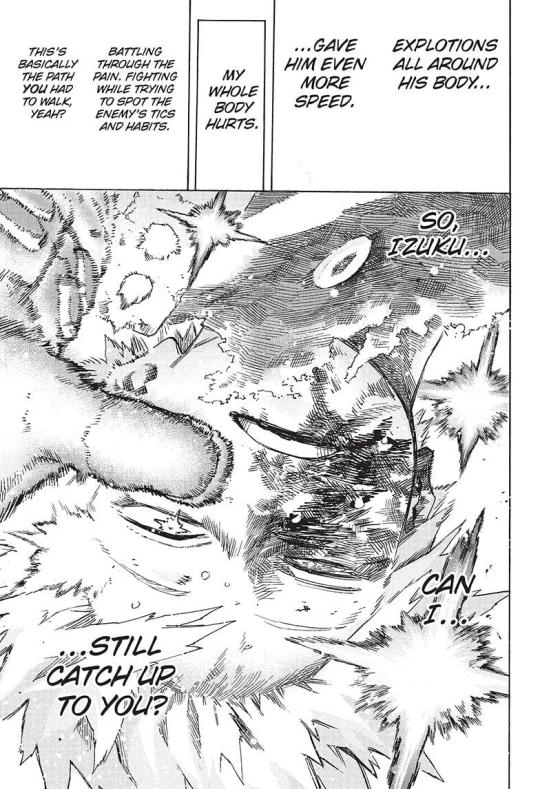
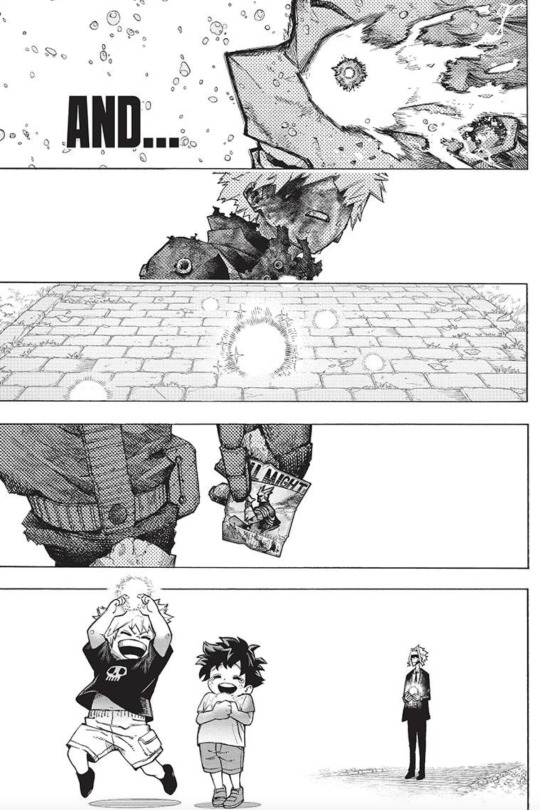
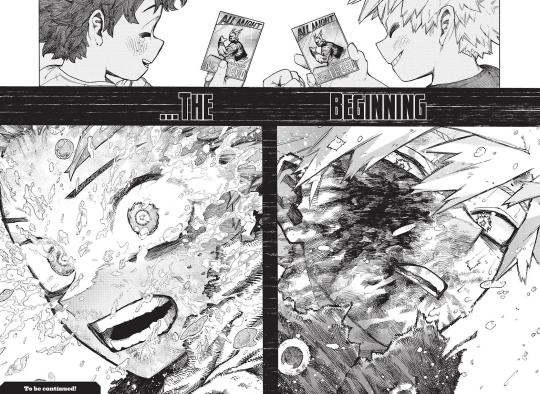
Izuku Midoriya cannot possibly have learned the fundamental lessons of what it means to be a hero without Katsuki Bakugou's character arc to supplement him. Katsuki Bakugou is an irremovable, integral player in demonstrating the theme of collectivism that informs the main story, not just for Izuku to learn it but for THE AUDIENCE to see it too. He is one half of "win to save, save to win." He is the standard shounen manga archetype who has to learn the value of teamwork/collectivism so that he can teach it to Izuku Midoriya and save him from himself. The story is structured in such a way that it resembles LESSONS for the characters to learn, and Katsuki's "education" in this respect is VITAL to the story, second in importance only to Izuku Midoriya's.

P.S. Is it actually taking away from Katsuki to call someone else THE deuteragonist?
Yes. I know some people don't want to have to say it that way, but it is. Based on a number of metrics, Katsuki Bakugou is most widely recognized as the deuteragonist. If there's a default answer to the question of who is the deuteragonist but you think the deuteragonist is someone else, then in order to be persuasive you must not only argue why you think your chosen character is the deuteragonist but why Katsuki Bakugou is NOT the deuteragonist. If you want to argue someone else is the deuteragonist, you are taking on that onus, that burden of proof. You have to disprove Katsuki Bakugou is the deuteragonist.
Are there other characters who fit the deuteragonist function at times? Yes! There are multiple deuteragonists! But if in spite of the multiple protagonists we're still able to call Izuku Midoriya THE protagonist of My Hero Academia, then we are absolutely able to call Katsuki Bakugou THE deuteragonist as well.
tl;dr MHA is about learning what it means to be a hero and Katsuki Bakugou's story is second-most important to that theme, which makes him the deuteragonist
#anon ask#ask pika#my hero academia manga spoilers#final showdown spoilers#katsuki bakugou#meta#deuteragonist#now just because i care does that mean i actually CARE?#no not really#think what you want you aren't doing anything to ME
150 notes
·
View notes
Text
like Callum made the right choice in 5x08 for his character and the thematic narrative. Thematically, Rayla cannot permanently die (she's too sacrificial) nor can she have a partner, honestly, who'd be willing to sacrifice her like that. Callum also cannot be willing to sacrifice her like that for the life of a stranger dragon he's never met, or not take the dark magic risk; not only is this how he's always clearly been ever since S1 ("But not everything [has changed]: I would do anything for you") but doing so would make him exactly like the worst of Viren: "If you have to choose between [the world] or your brother, pick the egg." Callum is having a dark path arc, but he's not having an antagonist or villain arc.
That said, there's a reason Callum is Chained Up when he gives the spell and locked in a damp dark brig and has to use the snake-chain spell specifically, because TDP loves its irony: what gets more ironic than freeing yourself from chains in order to free and save your girlfriend, when you know in doing so you're chaining yourself further and further to the main villain and his will in doing so? When you know that you would?
There's a reason 5x08 ends with Callum looking scared and sad and the shot of the snakes, because those aren't fun things (hi Ocean arcanum epiphany) to learn or fully accept about yourself. There's a reason that what characters justify with "I had no choice" or "this is the right thing to do" isn't always the literal case. "I had to, to save my friends" or you could've left it. You could've tried something else than dark magic. But you didn't, because you thought that was the one thing you could do in order to not lose your friend, so you did it; You Made Your Choice.
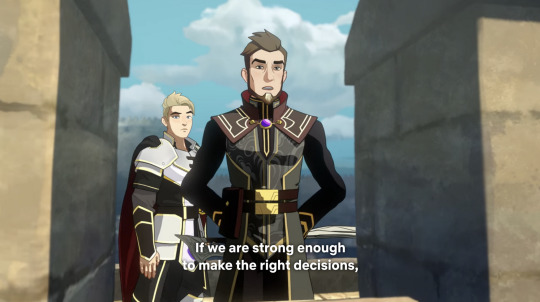
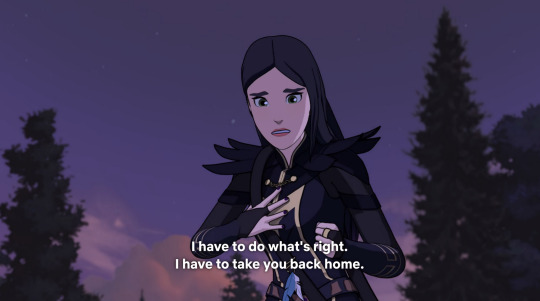
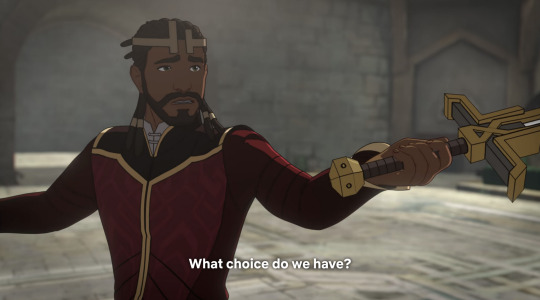
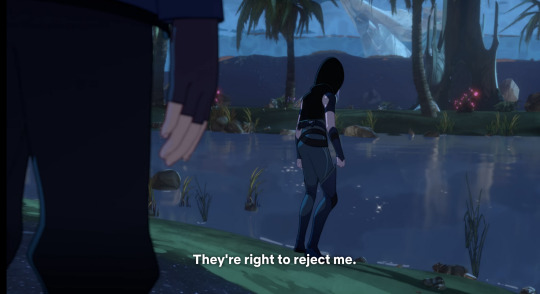
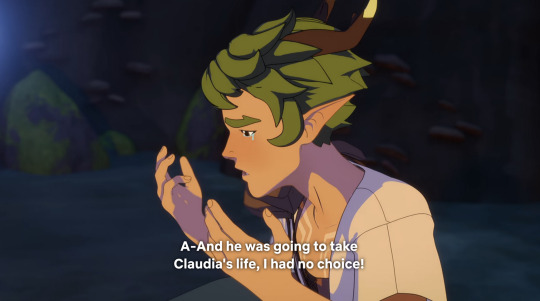
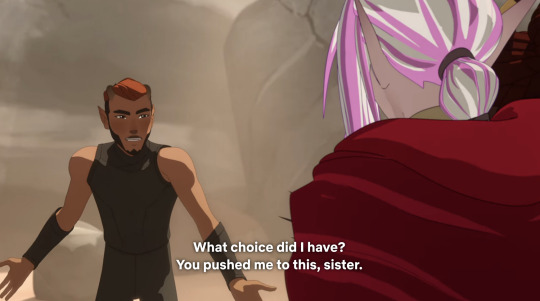
For example, if we're talking what happened in 5x08 in a "this would keep The World 100% safe" type of deal? Callum fucked up twice. He gave the spell and he didn't know Finnegrin would be dead or unable to use it by episode's end. He did dark magic — with no idea that it wouldn't let Aaravos automatically possess him in that moment — because a world where he didn't even try and save her was worse to him. But it was a risk! Both of those things were massive risks!
Just because they didn't amount to the extreme consequences they could have had, yet, doesn't mean that they won't, since soo much of TDP is just "this thing had unforeseen/unwanted consequences as a result of the choices you made" (the loss of Rayla's team, Harrow's death, Sarai's death, the possession at all, Karim's banishment, Zubeia's corruption, Claudia's 5 season long descent, and I'm sure going to the Starscraper next season, just to name a few quick examples off the top of my head). As Harrow says:
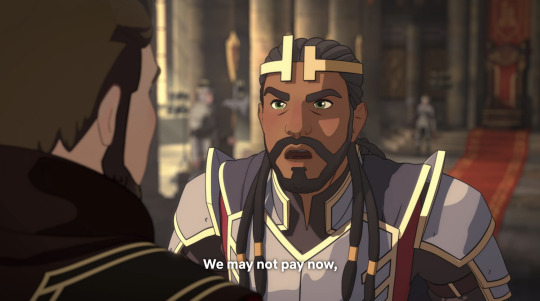
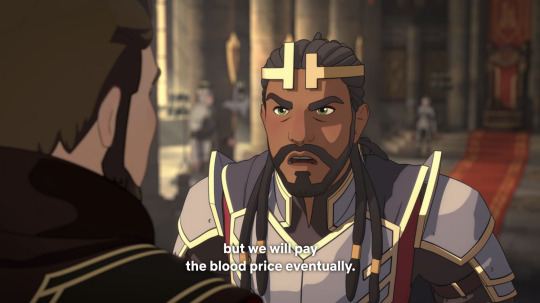
H: But I do know I will pay the price for the choices I've made. I've done terrible things. I thought they were necessary. Now I don't know.
Rayla thought she had to leave; she didn't. Rayla thought she had to find Viren, twice; that wasn't true. She chose to leave both times. She also chose to come back both times. She could've doubled down, but she didn't. Viren, finally, didn't.
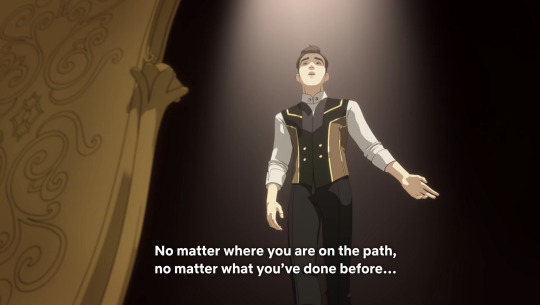
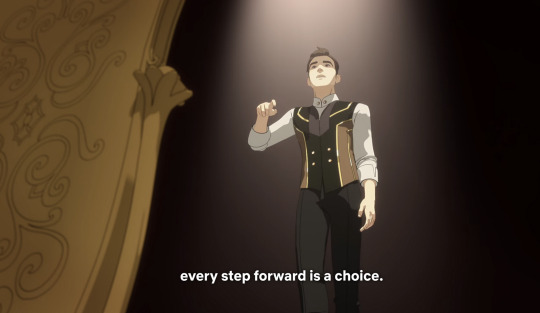
Every step forward is a choice.
That's true for Every Single Character in the show.
To deny them that is to deny the agency they do have in the circumstances they find themselves in; Soren could've not stabbed his father, Terry could've chosen to tackle rather than stab Ibis, Viren could've chosen to grieve his son. That doesn't mean they didn't have good reasons to do the things they were doing, that doesn't mean their justifications weren't strong, that doesn't mean they were necessarily wrong to do so. But they made Choices.
So did Callum. And he chose what regrets, sacrifices, and losses he could live with, in order to save the person he decided he couldn't live without.
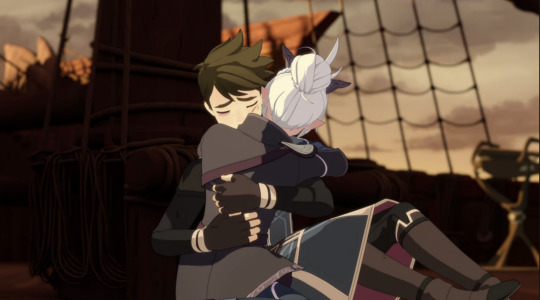
It's that simple, and that complicated.
#5x08#snake boi callum#subset: choices#'he had no choice' didn't he though#'he did the right thing' for the narrative and himself#but it's already biting him in the ass and the plot is gonna beg to disagree in s6#tdp#the dragon prince#like fictional characters do not have real agency however#what choices they do or don't make even in dire circumstances#especially in dire circumstances. absolutely reveals their character and priorities#like this show is nothing but high stakes. Hello
115 notes
·
View notes
Text
Lorch is being confusing about writing conventions again.
[Lily's Post]

Just because people tend to use villain and antagonist interchangeably doesn't mean they mean the same thing in a literary sense. So in order to demonstrate a protagonist can be a villain, that an antagonist isn't necessarily a villain and a villain can have a valid point lets go to the Breaking Bad universe!
Walter White

Villain. Protagonist. There you go.
Everything bad that happens to Walter after his cancer diagnosis is the consequence of his own decision making. He doesn't have a good motive. He keeps telling himself "I'm doing this for my family" but it's really for his own ego. An ego that grows and grows out of control as he fails upwards through the drug trade only to have it all justifiably come crashing down on him in the end. He's bitter, angry, full of unwarranted self-importance and only accomplishes ruining the lives of his family and everyone around him before his death.
Chuck McGill

Here's a complex antagonist for you. I was impressed when I first watched Better Call Saul that they managed to make a even pettier narcissistic manbaby than Walter White. But he's also more nuanced than Walter.
Chuck is a highly respected lawyer in his field. He's suffering from electromagnetic hypersensitivity, a psychosomatic mental illness that is borne of his own controlling nature and pride. It is real to him and he's really suffering from the effects of it. He has always resented his brother Jimmy (Saul) for being the more personable, charismatic brother. He liked when Jimmy was just a burnout loser running schemes and getting arrested for public indecency because he at least had his success and his devotion to the law over him. But when Jimmy decides to get his life together by following in Chuck's footsteps? Chuck gaslights him, sabotages him, does all this underhanded shit while shaming Jimmy for doing the same.
But was he wrong about Jimmy not being able to resist falling into his baser instincts to circumvent the rules? Would Jimmy had gotten as bad as he did if Chuck had just supported him, or was this always going to be in him?
Gustavo Fring

The villain with a point.
Gay icon who played a 20 year long game to murder the Salamanca clan and the cartel leaders to avenge his boyfriend. Legend.
Gus is unequivocally a villain. He has devoted his entire life to this one thing and doesn't give a shit about anything else. His street dealers can kill kids for all he cares, he'll slit a minion's throat to intimidate Walter, he'll threaten Nacho's dad to keep him in line as a forced double agent. But he's also taking out dangerous criminals. He also runs a legitimate restaurant business as a front for his drug empire, takes pride in the food quality and treats his employees there well.
I think Lorch of all people would definitely argue that Gus is pretty damn justified to desire revenge when Hector shot his lover through the brain right in front of him. Have fun with that one, asshole.
Bonus round!
Mike Ehrmantraut

How the FUCK do you even classify best girl Mike as a character? He was unplanned, added to the show as a fluke, a stand-in character when Bob Odenkirk wasn't available to film, and became one of the most fascinating, well-written characters across both shows.
Is he an antagonist? A protagonist? A hero? A villain? He's been all of these things at various times.
youtube

To Lily "has a point" only has to be "expresses a correct or valid idea" so there you are. Chuck and Gus both have valid points. Walter doesn't. And Mike is a medley of I don't even know what the fuck.
61 notes
·
View notes
Text
OK analysis time! Matt said that Marcy's affection towards Sasha was more surface level than Anne's, which was described as "complicated." People might assume that this means that Marcy's affection for Sasha wasn't deep, or that their relationship wasn't.
If we're being honest here they weren't presented as having depth to their relationship so much as having acts and services. They're on the level with each other and can interpret each other's needs for a plan but they are lacking somehow when it comes to each other's emotional needs. This is something Darcy touches upon when they say they might not have ever been friends at all, and might be a core conflict between Sasha and Marcy. It's also a good example of why Anne is the actual Heart of their friendship. She connects and makes their dynamic deeper. While Marcy is desperate to keep people together and hates being alone, she admits she lacks a core understanding of emotional intelligence and this is something she admires in Anne. Marcy treats herself as a tool and mostly makes friends by doing things for them and complimenting them. She's kind of the perfect POV character for a journal that gives lore specifically because she's very attentive to things like strengths and weaknesses and team synergy, but isn't necessarily attuned to emotional intelligence. She kind of blocks herself off from feeling certain things too keenly or doubting herself, and masks it using this peppy overachiever persona.
Maybe if Marcy were more emotionally self aware, she would have been even more openly hurt by how dismissive Sasha is of her interests (even though Sasha clearly does like nerdy things), or she would have noticed that her friends don't really care for RP (etc). But in the series what we see is a Marcy so afraid of being left alone that she'll hide every emotion and every hurt aside from what she thinks will make people stay - she delivers compliments, improves infrastructure, says all the right things to earn trust. She's a great twist antagonist! Admitting that her friends don't or can't reciprocate her interests or desires is important to her arc, because it serves as a lesson to her that friendship is more than just doing things together or doing things for each other. Marcy and the others aren't just tools in schemes and plans.
We hear from Anna that Sasha has difficulty knowing when to bring other people to the table, so for someone like Marcy who thinks that she needs to earn everything through acts/upgrades, it makes sense that their relationship remained very surface level. Neither of them pushes the other to see things differently, while Anne does. Anne can acknowledge where people hurt and hurt her, and can acknowledge that this doesn't mean they aren't friends or significant to each other. Anne notes the complexity! It's why she's so compelling.
So, Marcy acknowledging how hurt she is that her friends don't want to do what she wants is significant because she also says, "I believe in you." Love goes beyond the stuff we do for each other. There's a bit of faith, too. What she did isn't right either. Being hurt isn't an excuse.
Darcy isn't just "evil Marcy," the Core is also every temptation for Marcy. Escapism, distraction, perfect friends who go on quests with her whenever she wants. There's a darkness to this kind of insecure attachment that Darcy reveals. Fear of inadequacy and irrelevance. Fear of loss. Fear of change. Fear of what is deeper than skin deep. Maybe my friends will forget me if I move. Maybe I'm just their nerd, just like Sasha's just cool. So their relationship isn't surface level to us, because this nuance is communicated to us through the subtleties of the show's execution. It's a really well acted, well boarded, well written show with fantastic music! It's really amazing!
Sasharcy IS very complicated! But it's complicated because they never dig deeper with each other until it's too late. It's also why it's significant that Sasha is the one to ask, "Can we save this friendship?"
Why is friendship with Marcy so easy? Is it because they got along and there's mutuality here, or is it because they didn't let themselves get any deeper than what was easy? It's so easy for them to just be the controller and the executor.
Forgiveness is hard. Forgiveness takes time. It takes a lot of thought, discussion, and work. Friendship in the long term, deep enough to mean something and hurt when it's gone, is similar. It's not just sentimentality and acts of appeasement.
aaaaand that's what i think matt meant when he was like "marcy's affection for sasha was kind of surface level"! I will admit I was like noooo Matt noooo don't say it was surface level whyyyy but like i had time to think abt it so i'm fine now lol lmk ur thoughts💙
smth i didn't add to my original tweet thread is that i DO find it interesting that marcy appears to specifically empathize with the experience of lonely people who grow up a certain way or doing things a certain way to protect themselves from loneliness. she seems to have an intuitive understanding of people fitting into groups via niches, but is drawn to people who already seem like outcasts as opposed to being able to identify it when someone is surrounded by people they seem to easily connect with. Marcy has this fundamentally insecure and lonely viewpoint that makes her very interesting to read and analyze, and I suspect it also contributes to her popularity. I mean, clearly *I* love her
#amphibia#sasha waybright#marcy wu#amphibia analysis#sasharcy#clearly I LOVE marcy or else I wouldn't be so harsh on her! shout out to you matt braly you know what's real
124 notes
·
View notes
Text
late s3 coffy is so crazy bc at first glance theyre like wow we are simply not going to let these girls interact after helpless because buffy is really busy with her other brunette shadow self right now but in fact cordy's whole pursuit of wesley is like.
okay you've been obsessed with a girl since she moved here three years ago and you wanted to be her best friend but she chose the freaks and weirdos over you. so you mock her for being a freak and a weirdo but in this way where you're always going out of your way to do it, and you always have this baseline awareness and jealousy of her, you are always trying to date the boys she dates, but it's just regular popular girl-weird girl antics right? it's just regular popular girl-weird girl she hates antics to go to her when you're afraid for your life, put your safety in her hands, and tell her i know you share this feeling we have for each other, deep down. and the week after that you become unwittingly aware of her secret identity and it makes sense to you so quickly, you enfold yourself into her world with such ease. but you're still not allowed to be friends with her. you start dating one of her weirdo freak friends though, and admit to yourself later on that you only dated him because of his link to buffy. you detach yourself from your popular girl friends and become totally ensconced in this girl's friend group, you're one of them now, you've thrown in your lot with her. but she still doesn't like you, and you don't like her, but not because you actually even necessarily dislike each other. i know you share this feeling we have for each other, deep down. but your personas are people who don't get along, because you're the popular girl and she's the weird girl. even though you're not popular anymore. even though you're just as weird as her now. even though she was popular too, at her old school. even though you hang out all the time. even though you're dating her best friend. you're still not friends, you're just people who can't stop insulting each other. and then her best friend cheats on you with the other best friend. and the girl tries to make amends with you, tries to tell you she can be there for you, that you're allowed to be friends, for real, you don't need the guise of dating her best friend for you guys to hang out. i know you share this feeling we have for each other, deep down. but you're so angry at her, because she's the reason you became weird in the first place, if she had never moved to town, you would never be like this, you would have everything you used to have, and she did all of this to you, and did it all without even liking you that much, and you didn't like her that much either, except you do, of course, and she likes you. but you guys can't say that to each other at the same time. there always has to be one of you pulling away. even though i know you share this feeling we have for each other, deep down.
and now you don't have a link to her anymore. you're not dating her friend. you've rejected her offer to be friends despite that. but you can't just ... not see each other. right? so you still hang around, to insult her, to trade barbs, to call her a freak, and even though you'll never gain back what you had before she made you lose it, it's okay, because she's still the weird one. not you. even though you still only talk to the weirdos. that's okay though. that's okay, because you still see her sometimes. i know you share this feeling we have for each other, deep down. and then when she's at her weakest, you're there for her, and you protect her, and she's always protected you, and now for one second, for the very first time, you are on equal footing.
and that doesn't mean you have a place in her life. you still don't see one for yourself. trying to be friends is too scary. and she has a whole new girl she's being antagonistic with now. but luckily, her new watcher moves to town just after this happens. so you attach yourself to him, so you can have a reason to stay in the girl's orbit. you're always around, but it's not about her. maybe it could be, but it's not, you just like her watcher, that's all. see, you're not even talking to her. you're just trying to form an emotional bond with the person who, as far as you know from the only other watcher she's ever had, is going to be a huge figure in her life from here on out. and you don't talk about it, but that's okay. because i know you share this feeling we have for each other, deep down.
and then you can't bear to stay in the town where she lives anymore but you also can't bear to not have anything to do with her so even though you don't talk anymore, you move to her hometown, and end up working side by side with her ex boyfriend and that same ex watcher and fighting demons just like she does, forever, for the rest of your life
171 notes
·
View notes
Text
My toxic trait is thinking that if we must put Melinoe's situationships into parallels from the previous game the obvious way to go about it is this (Cut for spoilers for surface route):
Melinoe/Nemesis: Hades/Persephone. Hades is largely a pretty offstandish guy the same way Nemesis is herself very standoffish. Both are known for their cutting insults. Despite this, deep down they do care and do cave into Persephone/Melinoe's interests and soften up over time. Persephone/Melinoe counter their personalities, and are much smaller than both.
Melinoe/Moros: Nyx/Persephone. Both are the quiet, reserved, and nice/polite God Incarnates who help Persephone/Melinoe with tasks even when they don't necessarily agree with the decision (Helping Persephone flee the underworld/Moros giving the incantation to Mel to go to the surface). They go behind the rules to get what their LI wants or needs (Nyx reviving Zagreus/Moros getting the Fated List for Mel and later showing up at the Crossroads cause she summons him).
Melinoe/Eris: Megaera/Zagreus. They are antagonists to one another, even fighting their own boss battle where they throw insults at each other that carries over after battle. Eris is a free spirit who disrupts Melinoe's routine for her personal goal(s) just like Zagreus does with Meg and seemingly doesn't seem to realize or care about the damage she does. Melinoe gets pissed off when Eris defeats her, much like Meg does early on when Zagreus does and accuses Eris of ruining her job. Eris seems to be a bit needy when it comes to companionship, like Zag. Both "couples" seem to have personal history with one another, though this is where maybe the friends like Than/Zag come in or could be played straight like Meg/zag
Melinoe/Icarus: Thanatos/Zagreus. Once again Mel is the counterpart to Zagreus. Melinoe and Than both are the "friend" left behind when Icarus/Zag leaves for the surface. Both were very close when their younger, and like Than goes out of his way to help Zagreus, Melinoe did the same to help Icarus. Mel does miss Icarus very much, the same way Than did when Zagreus "left without saying goodbye." That being said, both Zagreus/Icarus do not feel the need to stop what they're doing for Thanatos/Melinoe. Both have support assist type encounters (though this is where the gameplay is flipped). They might've actually been a thing in the past where they had a relationshop ala Meg/Zag instead of simply "friendship" like Than/Zag.
Not Included cause it's way too early to tell
Melinoe/Arachne: Zagreus/Dusa. Again, too early to tell, but it's a Hades descendant with a formerly human counterpart where the non-human provides a service/help for the Hades descendant. Whether Melinoe/Arachne ends up platonically or does go to endgame remains to be seen.
EDIT: Anyways what I mean by this is basically - I don't think it's a coincidence that the Zagreus parallels/counterpart relationships occur when Melinoe is going up to the surface - which was Zagreus's whole plan in the first game. Similarly, I'm not surprised in the route where Melinoe is "returning home" her romances there parallel that of her parents. Persephone returned home after all, in the first game.
#hades 2#hades II#hades II spoilers#Melinoe#Zagreus#Hades (hades)#Persephone (Hades)#Nyx (Hades)#Moros#Eris (hades)#Megaera (hades)#Icarus (hades)#Thanatos (hades)#Arachne (hades)#Dusa (Hades)#hadesgame#speculation
102 notes
·
View notes
Note
I'm annoyed by some of Martin's hypocrisy regarding Felix Kranken. He claims that there're no clearly evil or clearly good characters in twf, the show has a gray morality, etc. But at the same time, he refutes the fact that Felix was abusive towards Linda and makes their conflict much less dramatic and far-fetched. Like, abandoning a sick person who needs you simply because he said a few harsh words to you while drunk? Sorry, but in this situation the last thing I want to do is empathize with Linda.
And I understand why Martin did it: Felix is obviously one of the main characters, if not the main one, and the audience should sympathize with him. Martin probably doesn't feel comfortable making the wife-beater likable to anyone in any way, it probably violates his moral principles. But then why does he write a story with a GRAY and AMBIGUOUS morality with a child murderer antagonist at the center of the plot, if he can’t stand the everyday dirt that exists in real life?
I answered this ask with a lot of text. I've put it all under a cut, because it's long.
I really want to seem levelheaded and thoughtful in my response to this, because I never want to assume more than is absolutely necessary from a careless message on the internet. Y'know, It's just nice to be thoughtful when talking to people. It's good manners. I don't want to say anything needlessly incendiary. But before I respond to any of this, I really can't ignore just the legitimately vile misogyny in this message.
You think Linda is in the wrong for "abandoning" her husband over "a few harsh words" after she tried for TEN YEARS to salvage their marriage? And she only left for her own sake after a relationship-defining argument that made her realize she couldn't emotionally contend with the way he was treating her anymore? I'll get this very clear right out of the way: activism for addicts is something that I take incredibly seriously. People who are suffering with life-ruining addiction absolutely deserve networks of support, and they deserve respect and kindness, and they deserve easy access to social programs that are equipped to provide those things. Even the worst addict in the world, who's done the most terrible shit a person could imagine, deserves such a level of care that should be afforded to any human being. What none of that means, is that you, as in individual, in an interpersonal relationship with a person suffering from addiction, need to submit yourself to a life of flagellation for the sake of that person. Because that person is sick, and you aren't. No man's downward spiral is the fault of the woman who left him because he took it out on her.
Okay. With that out of the way, I can respond to the walten files part of this ask now. I'm not sure if you read my recap for the twitter space where he talks about Felix and Linda's relationship, and I don't remember exactly how I did or didn't summarize what he said, but my opinion of what he talked about there was that he personally doesn't think of Felix and Linda's relationship being abusive, but that he doesn't think it would be necessarily incorrect to interpret Felix's behavior as emotionally abusive or neglectful, (he says this much almost verbatim,) which makes a lot of sense to me. To him, the problem with their relationship was that they were kind of fundamentally romantically incompatible beyond the point of reconciliation, but that they (primarily Felix,) weren't willing to recognize that and dial back their relationship to just being friends (because they are, he says, incredibly important to each other. It's not like their relationship was completely torrid and loveless. They loved each other.) He compares that to Charles' relationship with his (ex)wife, where they came to a mutual understanding that they weren't right for each other as husband and wife, but they stayed friends, because they cared about each other and otherwise their relationship was good.
I don't understand how that's less realistic or nuanced than. Felix beating his wife? So much of The Walten Files is about mourning things that could have been. It's about peering into times when things were good, and watching those gears turn and those mechanisms of tragedy fall into place, and seeing it come apart in a way that makes you ache. I think it's much more in-keeping with the narrative interests of The Walten Files that Felix's relationship with his wife wasn't some trite misogynist horror story, where he beat her and she left him and now he has Manpain about it, but as this much more human (as in, humanizing) sort of thing wherein there was such a clear path to improvement, but Felix sabotaged it in his lack of willingness to adopt agency within his own life. It rings alike to every other time he was has been and will be faced with the opportunity to do the right thing, and how he rejects it every single time, in his own unwillingness to help himself.
I don't know how any of that is in any way ignoring or sidestepping the consequences of real-world tragedy. Just because Felix isn't the terrible violent misogynist you seemingly want him to be, doesn't mean that he, as a character, doesn't reflect any aspects of reality. I think, in fact, Felix is meant to embody a lot of the worst tendencies you see in a lot of people, even you or I, who fail to help themselves out of situations they are objectively capable of improving. Out of a fear of action or consequence or upsetting the status quo. But in a way that is exaggerated and more suited to a narrative.
That, and I feel that Martin means more specifically that there are no "completely good" or "completely evil" characters in The Walten Files, which I feel is self-evidently true. Nobody is Evil Incarnate, and nobody is a messiah, or a perfect victim. Felix is terrible and his actions are condemnable, but you feel for him when you see his flaws as a human being, and there's meant to be a part of you that always hopes he'll eventually do the right thing. even if he doesn't and never will.
We're already seeing the reverse of that in characters like Charles and Susan, where they gossip amongst themselves about their friends' tragedies and thus far refuse to be proactive about Felix's shitty behavior, with Susan even saying outright that she wants nothing to do with it. It's really easy for me to imagine a version of these characters who see something like Felix trying to hide Rocket from Jack and Rose, and who immediately go "This is wrong! I'm going to tell them right away!" and I really do like that they don't do that. There's a degree of complicity. They're just done with getting wrapped up in Felix's shit, even if it means they end up a bystander to something really shady, and I like that it makes them more nuanced as people, instead of being so perfectly virtuous. There's a balance of this. The Walten Files' interest in the morally gray doesn't just mean that the villains get off easy, but rather that the people in it behave as people do, and are sometimes flawed or self-interested. And I think this sort of thinking is going to become a clearer pattern as the series goes on.
#ask#i tried to be understandable in this ask and I tried not to get too incensed#but I really cannot stand linda thompson disrespect. I will defend her with my life
58 notes
·
View notes